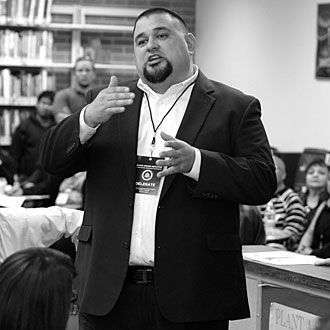Short Stuff 26.4
Illustrator: Benjie Sanders | Arizona Daily Star

Sean Arce, co-founder and director of the Mexican American Studies program in Tuscon
SEAN ARCE HONORED—AND FIRED
Sean Arce, co-founder and director of the Mexican American Studies program in Tucson, Arizona, received the first Myles Horton Award for Teaching People’s History from the Zinn Education Project (ZEP) on April 2, 2012. ZEP honored Arce “for his instrumental role in nurturing one of the most significant and successful public school initiatives on the teaching of history in the United States.”
“Tucson’s Mexican American Studies program gets it absolutely right,” explained ZEP Co-Director and Rethinking Schools Curriculum Editor Bill Bigelow. “Ground the curriculum in students’ lives, teach about what matters in the world, respect students as intellectuals, and help students imagine themselves as promoters of justice.”
Only a few weeks later, Arce was fired by the Tucson school board. The board told him they “were going in a different direction,” Arce said on Democracy Now!, “but in fact we know this was an act of retaliation in that I, along with many others, stood up”—to HB 2281, which outlawed Tucson’s Mexican American Studies program (see “Outlawing Solidarity in Arizona,” spring 2012).
Arce told Colorlines reporter Julianne Hing that he was not surprised he was fired. “It did not surprise me at all, given the politics of the state of Arizona. Unfortunately, our local officials have cowered to these very discriminatory policies, so when we spoke out against the law, it left all of us vulnerable. . . . It’s tragic, yet at the same time, we’re very fortunate that we have such a close-knit community that youth and elders are able to organize together, to dialogue together. The youth are not future leaders, they are current leaders, they’re courageous. It’s just unfortunate we can’t say that about our public officials, or our school board, or local school administrators.”
Arce’s award is named for Myles Horton, one of the most influential educators of the 20th century and co-founder of Highlander Folk School in Tennessee, famous for its pivotal role in desegregation efforts. In 1961, segregationists attempted to close Highlander on trumped-up charges, to which Horton replied: “A school is an idea, and you can’t padlock an idea.” Not in Tennessee, and not in Arizona.
FIGHT TO DEFEND PUBLIC EDUCATION IN PHILLY
The Philadelphia public schools became one of the largest school districts in the country to announce its near demise. In late April, Thomas Knudsen, the district’s chief recovery officer, unveiled a surprise five-year plan to close 64 schools (25 percent of the system), move 40 percent of students into charters, slash central office to 20 percent of its former capacity, and divide the rest of the district into “achievement networks” run by third-party operators.
In a press conference to announce his support of the plan, Mayor Michael Nutter said the Philadelphia school district faced near “collapse” and that the plan was something Philadelphians needed to “grow up and deal with.” Although the district plan was supposedly in response to a fiscal crisis, city officials later admitted that charters and the achievement networks would not save the district any money.
The announcement was roundly criticized by parent, community, student, and labor groups, who said they had been shut out of any dialogue. Educator Diane Ravitch dismissed the district plan as thinly veiled privatization. She described it as “shuffling deck chairs on the Titanic.”
Parent activist and Rethinking Schools editorial associate Helen Gym wrote an open letter to Knudsen: “I am the mother of three children in district and charter schools in this city. I have been actively involved in stopping good schools from decline and helping low-performing, violent schools turn around. . . . You’re not speaking to me when you equate closing down 64 schools—many of them community anchors—as ‘streamlining operations,’ yet you’ll expand charter populations willy-nilly despite a national study showing two-thirds of Philly charters are no better or worse than district-managed schools. You’re not talking to me when your promises of autonomy come minus any resources, and when the best you have to offer is ‘seat expansion’—which just means larger class sizes without extra funds. . . . The most basic things parents and staff and students have called for—more teachers in our schools, bilingual counselors, nurses, art and music, librarians, fresh food in the cafeteria, new buildings, and playgrounds—are completely and utterly absent for your ‘plan.’…
“We’re tired of the ridiculous labeling of schools as high-performing and low-performing. The label mentality assumes schools are in permanent stasis rather than in varying stages of evolution and devolution, highly dependent on resources and institutional priority. By simply expanding high-performing seat capacity and closing down low-performing schools, you fail to understand or even seek to understand the very elements that make a level of performance possible.”
Gym concludes: “I believe in the possibility of school transformation and the role that community and parent voices play in concert with schools and districts. I believe in the value of the public sphere and the responsibilities it owes to the most marginalized of communities—our immigrant students, special needs populations, and young people struggling with disciplinary issues. . . . I believe our communities have always been there to pick up the pieces after administrations of hubris pass on. And I believe our public schools are worth fighting for.”
Philadelphia has been under state takeover since December 2001. Its former superintendents have included Paul Vallas and Arlene Ackerman, both of whom left the district in financial chaos.
Just last June, Philadelphia ended a disastrous nine-year experiment with education management organizations (EMOs) that cost the district more than $120 million in management fees with poor results. All the EMO schools were returned to district control or turned into charters. District officials claim that the primary distinction between achievement networks and the EMOs will be that achievement networks will be run by nonprofits rather than for-profit companies.
Organized opposition to the plan is building. A coalition of union, parents, youth, faith, and community organizations recently formed to oppose the district plan. Clergy and community groups are hosting meetings, one of which drew more than 2,500 people.
BIOLOGICAL WEAPONS TRAINING IN MIDDLE SCHOOL?
Math and science teachers from the Cecil County, Maryland, school district attended a three-day workshop led by “subject matter experts” from the U.S. Army Edgewood Chemical Biological Center (ECBC), the Department of Homeland Security, and the FBI April 12–14. As the ECBC press release explained, “The content and methods they offered during the training were designed to assist teachers with the development and implementation of compelling math lessons that will soon be based on common core state standards.” The training, it is clear, was also aimed at tying math and science education to military and criminal justice applications.
For example, the 17 middle school math teachers visited ECBC’s protection factor test facility to learn about the use of math when testing military respiratory protection, then went on to learn about air forensics and white powder analysis. The FBI showed how to use math to identify an unknown substance.
“I can already think of numerous ways to tie this experience into my lesson on chemical formulas. For example, I would like to use nerve agent analysis as an exercise to apply chemistry,” one teacher said. “I look forward to using today’s presenters as future guest speakers in my classroom.”

